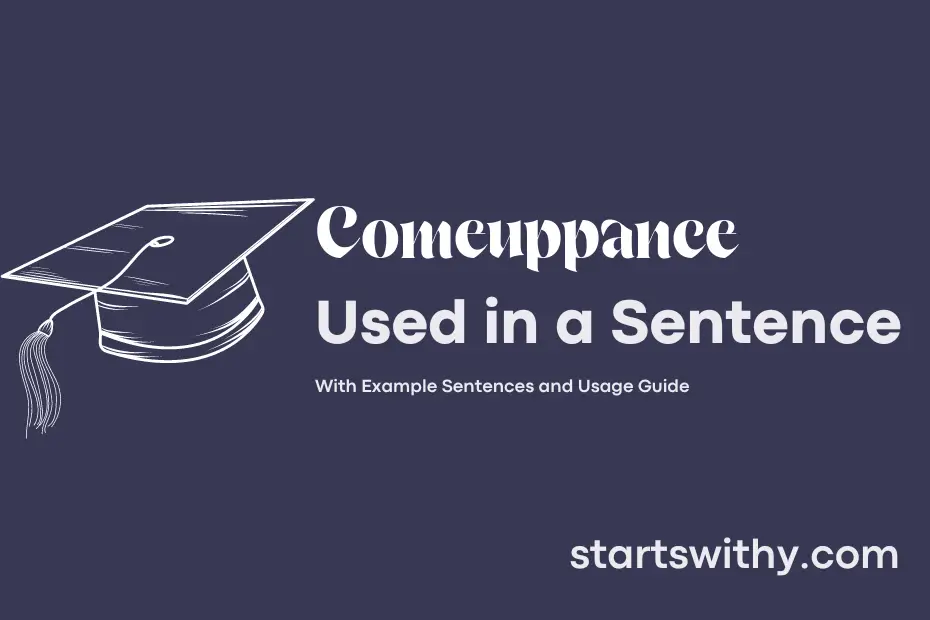Have you ever heard the term “comeuppance” and wondered what it means? In simple terms, comeuppance refers to the consequences or punishment that someone receives as a result of their actions.
It is often used to describe a situation where someone who has behaved arrogantly or wrongfully eventually faces the repercussions of their behavior. This can include facing criticism, embarrassment, or a loss of reputation.
7 Examples Of Comeuppance Used In a Sentence For Kids
- Tom was mean to his friends, so he got his comeuppance.
- Sarah didn’t listen to her teacher, and she got her comeuppance.
- The boy who cheated in the game got his comeuppance.
- Tina was rude to her parents, and she got her comeuppance.
- The girl who lied about her homework faced her comeuppance.
- Alex teased his classmates, but he soon got his comeuppance.
- Lily didn’t share her toys, so she received her comeuppance.
14 Sentences with Comeuppance Examples
- In a case of cheating during exams, the student received their comeuppance when they were caught and faced severe consequences.
- The student who always copied assignments finally got their comeuppance when the professor called them out in front of the whole class.
- After constantly procrastinating and failing to submit assignments on time, the student faced their comeuppance with a failing grade.
- The student who bragged about their grades constantly got their comeuppance when they failed an important test.
- When a group of students were caught plagiarizing their essays, they each received their comeuppance with academic probation.
- The student who bullied others in the college faced their comeuppance when they were suspended for their behavior.
- After spreading rumors and causing drama on campus, the student finally got their comeuppance when they lost all their friends.
- The student who always skipped classes had their comeuppance when they failed the semester due to poor attendance.
- Despite being warned multiple times, the student who disrupted classes faced their comeuppance with a letter of reprimand from the college administration.
- A student who cheated in a group project got their comeuppance when their teammates reported them to the professor.
- The student who constantly disrupted lectures faced their comeuppance when they were asked to leave the class by the professor.
- When the student was caught vandalizing college property, they received their comeuppance with a hefty fine and community service.
- The student who always made excuses for missing deadlines faced their comeuppance when their final grades were affected by their lack of responsibility.
- After being caught stealing from the college library, the student faced their comeuppance with a suspension and a mark on their academic record.
How To Use Comeuppance in Sentences?
To use Comeuppance in a sentence, start by understanding its meaning: receiving a deserved punishment or outcome, especially after behaving arrogantly or wrongly. For example, “The dishonest politician finally got his comeuppance when he was caught in a corruption scandal.”
When incorporating comeuppance into a sentence, make sure to use it in context. Think about situations where someone is experiencing a consequence for their actions or behavior. For instance, “After years of mistreating her employees, the cruel boss finally got her comeuppance when they all quit on the same day.”
You can also use comeuppance in a more light-hearted manner, such as when someone gets a humorous or ironic form of payback. For example, “The prankster thought he had pulled off the ultimate joke, but he got his comeuppance when his friends turned the tables on him.”
In summary, to effectively use Comeuppance in a sentence, remember to consider the appropriate context and ensure that it accurately reflects a situation where someone is facing the consequences of their actions. With practice, you can incorporate this word into your writing to add depth and meaning to your sentences.
Conclusion
In conclusion, “comeuppance” refers to the punishment or retribution that someone receives for their wrongdoings or bad behavior. It is often seen as a form of poetic justice, where the individual gets what they deserve as a result of their actions. Examples of comeuppance can be found in various aspects of life, from literature and films to real-life situations where individuals face the consequences of their choices.
Whether in a story where the villain meets their downfall or in a scenario where someone faces the repercussions of their unethical decisions, comeuppance serves as a reminder that actions have consequences. It highlights the idea that dishonesty, cruelty, or other negative behaviors will eventually catch up with individuals, leading to their inevitable punishment. Overall, the concept of comeuppance serves as a moral lesson and a narrative device to underscore the importance of acting with integrity and fairness.



